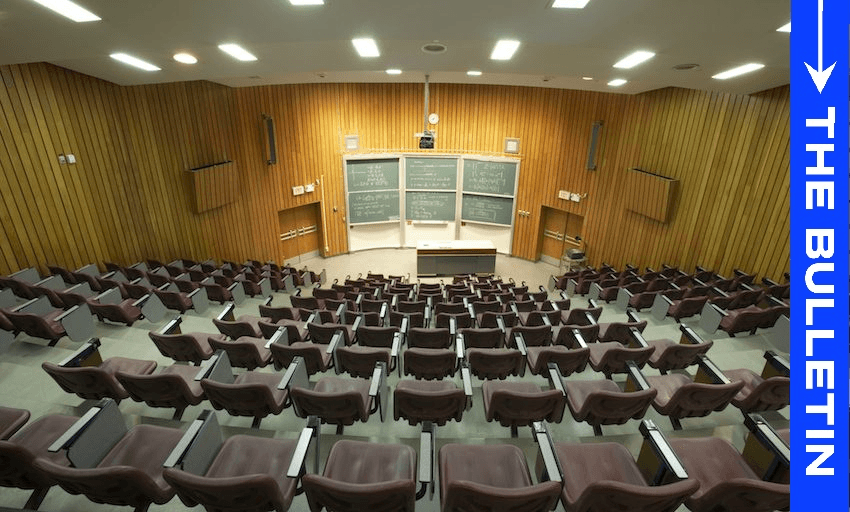Students aren’t returning to lectures on campus, enrolments continue to decline, employment in the sector remains precarious and the financials are grim. Just how much trouble are universities in asks Anna Rawhiti-Connell in this excerpt from The Bulletin, The Spinoff’s morning news round-up. To receive The Bulletin in full each weekday, sign up here.
Online lectures the “new normal”
It’s been three years since Covid first arrived in New Zealand and one aspect of life looks like it has changed quite permanently as a “new normal” beds in. As Aucklanders brace themselves for “March madness” on the roads, a phenomenon partially attributed to the return of students to the city’s tertiary education campuses, RNZ’s John Gerritsen reports that students aren’t actually returning to lecture halls on campus. Victoria University of Wellington Students Association president Jessica Ye said universities were misguided if they thought students would flock to lectures just because Covid restrictions had changed. Ye describes traditional lectures as “an incredibly passive learning experience” that’s “almost best served” by watching recorded lectures online.
The complex realities of student life
Last year, 3,000 students at Te Herenga Waka – Victoria University of Wellington signed a petition asking the university to make access to lecture recordings universal. The Spinoff’s Shanti Mathias reported on it at the time. The need to work to pay bills, illness, disability and family responsibilities were cited as reasons why students want the flexibility online lectures afford. Lecturers describe the emptier lecture halls as demoralising and universities are actively encouraging students to return to campus. There are a lot of reasons to want to maintain a thriving, busy campus, but one of them is financial.
University enrolment figures are continuing to decline
Te Herenga Waka – Victoria University of Wellington reported a $15.7m deficit for last year and new vice-chancellor Nic Smith says that if students don’t come to the university and be physically present on campus, the university’s losses could grow. Smith describes this year’s lower-than-anticipated student enrolment figures as “confronting”. Auckland University of Technology recently ditched its plans for redundancies after losing a legal challenge and jobs for affected staff have been guaranteed for at least six months. Declining attendance was originally cited as one of the reasons for the redundancies. Unless current trends are miraculously bucked, it’s hard to see how the current environment of precarity for those who work in the sector will stabilise. University of Auckland staff will strike today for 23 hours from 12.30pm with progress on collective agreement negotiations described by the Tertiary Education Union as “slow”.
“Make no mistake, universities are in trouble”
The passivity of the more traditional tertiary education experience is also cited in discussions about the impact of artificial intelligence (AI) on the sector. It’s another issue Shanti Mathias has covered for The Spinoff recently. “If AI can perform the same basic synthesis that university students are assessed on, then what value does the learning they’re being assessed on provide?” she asks. Former minister of education Steve Maharey is pretty blunt in a recent assessment of the future of universities, with a particular focus on financial sustainability. Headlined “Adapt or wither”, Maharey writes “Make no mistake, universities are in trouble.”


